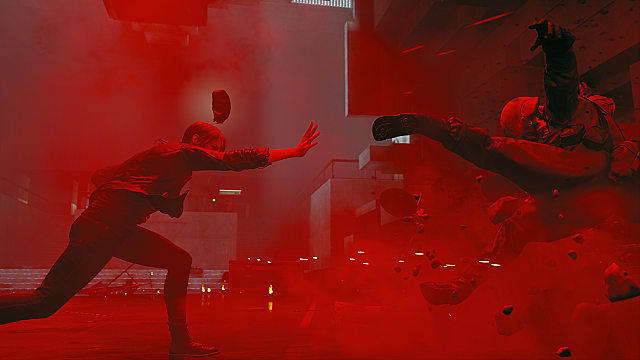

Remedy's illustrious history has two throughlines since the company's debut title launched in 1999: unconventional shooting mechanics and an obsessive commitment to storytelling.
Each of their previous major franchises, Max Payne, Alan Wake, and Quantum Break, tackled third-person shooters in new and interesting ways, while few players could easily forget any of their intoxicating tales. That tradition lives on in Remedy's biggest, weirdest, and, in many ways, best game yet: Control.
Though its efforts ultimately lack the atmosphere of Alan Wake or the emotional weight of Max Payne, Control is consistently a gorgeous and bizarre world of which it's worth exploring every inch. For longtime fans of the studio, four words could succinctly say it: Remedy does it again.

Control is the story of Jesse Faden, a woman who finds herself suddenly thrust into the role of Director at the Federal Bureau of Control (FBC). Think of this super-secret government body as an alternate version of the FBI in The X-Files, one where Mulder was promoted to the top rather than tucked away in the FBI's basement. The world of Control is full of weird stuff. The FBC is the clean-up crew.
Jesse, though, doesn't exactly want to be Director when she arrives at the FBC's headquarters, ominously named The Oldest House. Her role is one she quickly discovers to be a perfect fit, though, as her supernatural abilities give her the edge against The Hiss, an infection-like enemy that has invaded The Oldest House.
Over the course of 25 hours or so, Jesse digs deeper into Remedy's latest rabbit hole. As she uncovers more about the world around her, players will often be just as confused as she is, in a way that feels comfortably familiar to Remedy fans. Few other studios try to combine stylish action with ponderous plot points as much as Remedy does.
As The Oldest House is an ever-shifting building whose geometry is regularly disrupted through time and space distortions, such a setting allows Control to unravel its main plot at a satisfying pace, all while making plenty of time for optional missions that bring another element of The X-Files to the stage: Monster of the Week stories.
Even as their quest-givers can be disappointingly flat characters who wait around for you to talk to them, these side missions go far to flesh out the Metroidvania setting of Control. By consequence, a first playthrough can be dizzying or, at times, almost aggravating because the motivation to turn over every stone is so strong. Without spoiling much, fans will want to make time for the game's many collectibles and side missions, because they will start to paint a larger picture of what I'm calling the Grand Remedy Universe.

Most of the time, Control also delivers interesting boss battles, which is a first for Remedy. Several optional bosses are found in the game's side missions too, further lending to their importance.
The design of The Oldest House stands as a labyrinthine, brutalist monument to cover-ups and conspiracies. It is as exciting as it is detailed, and there's still plenty we don't know. Above all else, nothing about Control excites me more than that. But there's still a lot more worth getting excited about.
The star of all of the game's trailers has been Control's third-person shooting mechanics, which, while being initially reminiscent of Quantum Break's gunplay, quickly stand apart and above due to their scale and depth. Jesse's telekinetic throws and levitation abilities build one of 2019's best shooters by making every enemy interaction a highlight reel.
The Oldest House is infinitely responsive, so whether you're ripping up the floor beneath you to shield yourself, chucking large desks at Hiss variants, or dashing and floating around every makeshift battlefield, combat has rarely looked this cool. Papers fly around office corridors, railings get flung like limbo bars of death. Every inch of the setting is tactile and customized by your destruction. There are also about a dozen enemy types, so encounters can feel different not just chapter to chapter, but minute to minute.
An expansive skill tree is weighted just right where every upgrade decision is a tough one, but you never feel like you wasted your skill points either. Remedy tends to delve into power fantasy combat, and Jesse's mysterious powers fit right in with Jack Joyce's time stutters and Max Payne's slow-mo bullet time.
Control also looks stunning and serves as one of the foremost poster children for ray tracing (RTX), which looks poised to be the Next Big Thing in video games. Even on consoles where ray tracing isn't available yet, Control is obviously made by developers who know how to show it off. So many areas of the mazelike Oldest House seem designed to highlight the brilliant lighting and exhaustive textures. Remedy's in-house Northlight engine mostly dazzles in its second outing.
Unfortunately, a day-one patch to repair various issues was intended to address frame rate slowdowns, and while this issue has been improved noticeably according to my time before and after the patch, it hasn't fixed it completely. Some of the bigger battles can annoyingly slow down, and the game reliably stutters coming out of every pause menu.
I can't say if this issue will persist on other platforms — I reviewed with an Xbox copy and a colleague said it is persistent on a PS4 Pro, too — but I can say such issues don't tend to bother me as much as they may bother others. While I had issues with frame rate drops, they were overshadowed by so much else that Control gets right.

Pros:
- Another weird and wonderful story from a studio famous for them
- Combat provides for some of the coolest gaming moments you'll see all year
- Gorgeous set design from top to bottom
- Side missions give it an X-Files quality, often with Remedy's best boss battles
- Fleshes out the Grand Remedy Universe
Cons:
- Secondary characters feel flat
- Frame rate issues, especially after pausing or when enemy counts really get high
With X-Files-like side stories and its Metroidvania design, Control is obviously the biggest game yet for a studio that's historically focused on linearity. In a lovely way, it's also their weirdest game, with a plot that introduces more new phrases and big ideas than the rest of Remedy's catalog combined.
When frame rate issues don't spoil the fun, highlight reel combat continues a longstanding tradition of rethinking what makes a shooter, and all this helps serve the bigger picture no fan of the Finnish creatives should miss.
[Note: A copy of Control was provided by 505 Games for the purpose of this review.]
0 comments:
Post a Comment